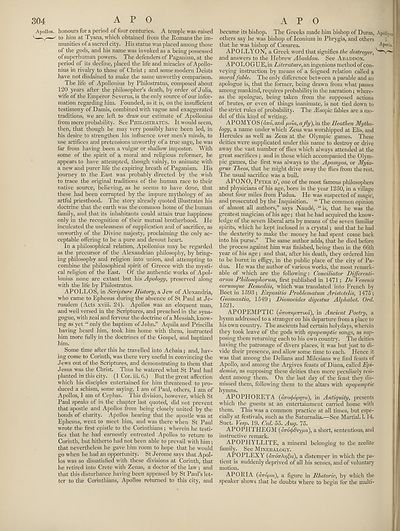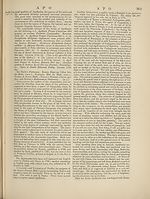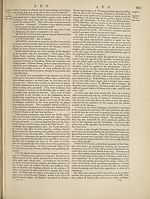Encyclopaedia Britannica > Volume 3, Anatomy-Astronomy
(312) Page 304
Download files
Complete book:
Individual page:
Thumbnail gallery: Grid view | List view

304 A P 0
A polios, honours for a period of four centuries. A temple was raised
^ to him at Tyana, which obtained from the Romans the im¬
munities of a sacred city. His statue was placed among those
of the gods, and his name was invoked as a being possessed
of superhuman powers. The defenders of Paganism, at the
period of its decline, placed the life and miracles of Apollo¬
nius in rivalry to those of Christ; and some modern Deists
have not disdained to make the same unworthy comparison.
The life of Apollonius by Philostratus, composed about
120 years after the philosopher’s death, by order of Julia,
wife of the Emperor Severus, is the only source of our infor¬
mation regarding him. Founded, as it is, on the insufficient
testimony of Damis, combined with vague and exaggerated
traditions, we are left to draw our estimate of Apollonius
from mere probability. See Philostratus. It would seem,
then, that though he may very possibly have been led, in
his desire to strengthen his influence over men’s minds, to
use artifices and pretensions unworthy of a true sage, he was
far from having been a vulgar or shallow impostor. With
some of the spirit of a moral and religious reformer, he
appears to have attempted, though vainly, to animate with
a new and purer life the expiring breath of Paganism. His
journey to the East was probably directed by the wish
to trace the original traditions of the human race to their
native source, believing, as he seems to have done, that
these had been corrupted by the impure mythology of an
artful priesthood. The story already quoted illustrates his
doctrine that the earth was the common home of the human
family, and that its inhabitants could attain true happiness
only in the recognition of their mutual brotherhood. He
inculcated the uselessness of supplication and of sacrifice, as
unworthy of the Divine majesty, proclaiming the only ac¬
ceptable offering to be a pure and devout heart.
In a philosophical relation, Apollonius may be regarded
as the precursor of the Alexandrian philosophy, by bring¬
ing philosophy and religion into union, and attempting to
combine the philosophical spirit of Greece with the mysti¬
cal religion of the East. Of the authentic works of Apol¬
lonius none are extant but his Apology, preserved along
with the life by Philostratus.
APOLLOS, in Scripture History, a Jew of Alexandria,
who came to Ephesus during the absence of St Paul at Je¬
rusalem (Acts xviii. 24). Apollos was an eloquent man,
and well versed in the Scriptures, and preached in the syna¬
gogue, with zeal and fervour the doctrine of a Messiah, know¬
ing as yet “ only the baptism of John.” Aquila and Priscilla
having heard him, took him home with them, instructed
him more fully in the doctrines of the Gospel, and baptized
him.
Some time after this he travelled into Achaia; and, hav¬
ing come to Corinth, was there very useful in convincing the
Jews out of the Scriptures, and demonstrating to them that
Jesus was the Christ. Thus he watered what St Paul had
planted in this city. (1 Cor. iii. 6.) But the great affection
which his disciples entertained for him threatened to pro¬
duced a schism, some saying, I am of Paul, others, I am of
Apollos, I am of Cephas. This division, however, which St
Paul speaks of in the chapter last quoted, did not prevent
that apostle and Apollos from being closely united by the
bonds of charity. Apollos hearing that the apostle was at
Ephesus, went to meet him, and was there when St Paul
wrote the first epistle to the Corinthians; wherein he testi¬
fies that he had earnestly entreated Apollos to return to
Corinth, but hitherto had not been able to prevail with him;
that nevertheless he gave him room to hope that he would
go when he had an opportunity. St Jerome says that Apol¬
los was so dissatisfied with these divisions at Corinth, that
he retired into Crete with Zenas, a doctor of the law; and
that this disturbance having been appeased by St Paul’s let¬
ter to the Corinthians, Apollos returned to this city, and
A P O
became its bishop. The Greeks made him bishop of Duras, Apoliv0D
others say he was bishop of Iconium in Phrygia, and others 11*
that he was bishop of Caesarea. Aporia.
APOLLYON, a Greek word that signifies the destroyer, V'“V'W
and answers to the Hebrew Abaddon. See Abaddon.
APOLOGUE, in Literature, an ingenious method of con¬
veying instruction by means of a feigned relation called a
moral fable. The only difference between a parable and an
apologue is, that the former, being drawn from what passes
among mankind, requires probability in the narration; where¬
as the apologue, being taken from the supposed actions
of brutes, or even of things inanimate, is not tied down to
the strict rules of probability. The iEsopic fables are a mo¬
del of this kind of writing.
APOMYOS (aTrd, and gvia, afly), in the Heathen Mytho¬
logy, a name under which Zeus was worshipped at Elis, and
Hercules as well as Zeus at the Olympic games. These
deities were supplicated under this name to destroy or drive
away the vast number of flies which always attended at the
great sacrifices; and in those which accompanied the Olym¬
pic games, the first was always to the Apomyos, or Myia-
grus Theos, that he might drive away the flies from the rest.
The usual sacrifice was a bull.
APONO, Peter d’, one of the most famous philosophers
and physicians of his age, born in the year 1250, in a village
about four miles from Padua. He was suspected of magic,
and prosecuted by the Inquisition. “ The common opinion
of almost all authors,” says Naude, “ is, that he was the
greatest magician of his age; that he had acquired the know¬
ledge of the seven liberal arts by means of the seven familiar
spirits, which he kept inclosed in a crystal; and that he had
the dexterity to make the money he had spent come back
into his purse.” The same author adds, that he died before
the process against him was finished, being then in the 66th
year of his age ; and that, after his death, they ordered him
to be burnt in effigy, in the public place of the city of Pa¬
dua. He was the author of various works, the most remark¬
able of which are the following: Conciliator Diffcrenti-
arum Philosophorum, first published in 1471; De Venenis
eorumque Remediis, which was translated into French by
Boet in 1593 ; Expositio Problematum Aristotelis, 1475 ;
Geomantia, 1549; LHonocides digestus Alphabet. Ord.
1521.
APOPEMPTIC («7ro7re/x7rn.Kd), in Ancient Poetry, a
hymn addressed to a stranger on his departure from a place to
his own country. The ancients had certain holydays, wherein
they took leave of the gods with apopemptic songs, as sup¬
posing them returning each to his own country. The deities
having the patronage of divers places, it was but just to di¬
vide their presence, and allow some time to each. Hence it
was that among the Delians and Milesians we find feasts of
Apollo, and among the Argives feasts of Diana, called Epi-
demice, as supposing these deities then more peculiarly resi¬
dent among them. On the last day of the feast they dis¬
missed them, following them to the altars with apopemptic
hymns.
APOPHORETA (dirocfiop'rjTa), in Antiquity, presents
which the guests at an entertainment carried home with
them. This was a common practice at all times, but espe¬
cially at festivals, such as the Saturnalia.—See Martial. 1. 14.
Suet. Vesp. 19. Cal. 55. Aug. 75.
APOPHTHEGM (aTTo^Oeypa), a short, sententious, and
instructive remark.
APOPHYLLITE, a mineral belonging to the zeolite
family. See Mineralogy.
APOPLEXY (dTroirXrfLs), a distemper in which the pa¬
tient is suddenly deprived of all his senses, and of voluntary
motion.
APORIA (aVopta), a figure in Rhetoric, by which the
speaker shows that he doubts where to begin for the multi-
A polios, honours for a period of four centuries. A temple was raised
^ to him at Tyana, which obtained from the Romans the im¬
munities of a sacred city. His statue was placed among those
of the gods, and his name was invoked as a being possessed
of superhuman powers. The defenders of Paganism, at the
period of its decline, placed the life and miracles of Apollo¬
nius in rivalry to those of Christ; and some modern Deists
have not disdained to make the same unworthy comparison.
The life of Apollonius by Philostratus, composed about
120 years after the philosopher’s death, by order of Julia,
wife of the Emperor Severus, is the only source of our infor¬
mation regarding him. Founded, as it is, on the insufficient
testimony of Damis, combined with vague and exaggerated
traditions, we are left to draw our estimate of Apollonius
from mere probability. See Philostratus. It would seem,
then, that though he may very possibly have been led, in
his desire to strengthen his influence over men’s minds, to
use artifices and pretensions unworthy of a true sage, he was
far from having been a vulgar or shallow impostor. With
some of the spirit of a moral and religious reformer, he
appears to have attempted, though vainly, to animate with
a new and purer life the expiring breath of Paganism. His
journey to the East was probably directed by the wish
to trace the original traditions of the human race to their
native source, believing, as he seems to have done, that
these had been corrupted by the impure mythology of an
artful priesthood. The story already quoted illustrates his
doctrine that the earth was the common home of the human
family, and that its inhabitants could attain true happiness
only in the recognition of their mutual brotherhood. He
inculcated the uselessness of supplication and of sacrifice, as
unworthy of the Divine majesty, proclaiming the only ac¬
ceptable offering to be a pure and devout heart.
In a philosophical relation, Apollonius may be regarded
as the precursor of the Alexandrian philosophy, by bring¬
ing philosophy and religion into union, and attempting to
combine the philosophical spirit of Greece with the mysti¬
cal religion of the East. Of the authentic works of Apol¬
lonius none are extant but his Apology, preserved along
with the life by Philostratus.
APOLLOS, in Scripture History, a Jew of Alexandria,
who came to Ephesus during the absence of St Paul at Je¬
rusalem (Acts xviii. 24). Apollos was an eloquent man,
and well versed in the Scriptures, and preached in the syna¬
gogue, with zeal and fervour the doctrine of a Messiah, know¬
ing as yet “ only the baptism of John.” Aquila and Priscilla
having heard him, took him home with them, instructed
him more fully in the doctrines of the Gospel, and baptized
him.
Some time after this he travelled into Achaia; and, hav¬
ing come to Corinth, was there very useful in convincing the
Jews out of the Scriptures, and demonstrating to them that
Jesus was the Christ. Thus he watered what St Paul had
planted in this city. (1 Cor. iii. 6.) But the great affection
which his disciples entertained for him threatened to pro¬
duced a schism, some saying, I am of Paul, others, I am of
Apollos, I am of Cephas. This division, however, which St
Paul speaks of in the chapter last quoted, did not prevent
that apostle and Apollos from being closely united by the
bonds of charity. Apollos hearing that the apostle was at
Ephesus, went to meet him, and was there when St Paul
wrote the first epistle to the Corinthians; wherein he testi¬
fies that he had earnestly entreated Apollos to return to
Corinth, but hitherto had not been able to prevail with him;
that nevertheless he gave him room to hope that he would
go when he had an opportunity. St Jerome says that Apol¬
los was so dissatisfied with these divisions at Corinth, that
he retired into Crete with Zenas, a doctor of the law; and
that this disturbance having been appeased by St Paul’s let¬
ter to the Corinthians, Apollos returned to this city, and
A P O
became its bishop. The Greeks made him bishop of Duras, Apoliv0D
others say he was bishop of Iconium in Phrygia, and others 11*
that he was bishop of Caesarea. Aporia.
APOLLYON, a Greek word that signifies the destroyer, V'“V'W
and answers to the Hebrew Abaddon. See Abaddon.
APOLOGUE, in Literature, an ingenious method of con¬
veying instruction by means of a feigned relation called a
moral fable. The only difference between a parable and an
apologue is, that the former, being drawn from what passes
among mankind, requires probability in the narration; where¬
as the apologue, being taken from the supposed actions
of brutes, or even of things inanimate, is not tied down to
the strict rules of probability. The iEsopic fables are a mo¬
del of this kind of writing.
APOMYOS (aTrd, and gvia, afly), in the Heathen Mytho¬
logy, a name under which Zeus was worshipped at Elis, and
Hercules as well as Zeus at the Olympic games. These
deities were supplicated under this name to destroy or drive
away the vast number of flies which always attended at the
great sacrifices; and in those which accompanied the Olym¬
pic games, the first was always to the Apomyos, or Myia-
grus Theos, that he might drive away the flies from the rest.
The usual sacrifice was a bull.
APONO, Peter d’, one of the most famous philosophers
and physicians of his age, born in the year 1250, in a village
about four miles from Padua. He was suspected of magic,
and prosecuted by the Inquisition. “ The common opinion
of almost all authors,” says Naude, “ is, that he was the
greatest magician of his age; that he had acquired the know¬
ledge of the seven liberal arts by means of the seven familiar
spirits, which he kept inclosed in a crystal; and that he had
the dexterity to make the money he had spent come back
into his purse.” The same author adds, that he died before
the process against him was finished, being then in the 66th
year of his age ; and that, after his death, they ordered him
to be burnt in effigy, in the public place of the city of Pa¬
dua. He was the author of various works, the most remark¬
able of which are the following: Conciliator Diffcrenti-
arum Philosophorum, first published in 1471; De Venenis
eorumque Remediis, which was translated into French by
Boet in 1593 ; Expositio Problematum Aristotelis, 1475 ;
Geomantia, 1549; LHonocides digestus Alphabet. Ord.
1521.
APOPEMPTIC («7ro7re/x7rn.Kd), in Ancient Poetry, a
hymn addressed to a stranger on his departure from a place to
his own country. The ancients had certain holydays, wherein
they took leave of the gods with apopemptic songs, as sup¬
posing them returning each to his own country. The deities
having the patronage of divers places, it was but just to di¬
vide their presence, and allow some time to each. Hence it
was that among the Delians and Milesians we find feasts of
Apollo, and among the Argives feasts of Diana, called Epi-
demice, as supposing these deities then more peculiarly resi¬
dent among them. On the last day of the feast they dis¬
missed them, following them to the altars with apopemptic
hymns.
APOPHORETA (dirocfiop'rjTa), in Antiquity, presents
which the guests at an entertainment carried home with
them. This was a common practice at all times, but espe¬
cially at festivals, such as the Saturnalia.—See Martial. 1. 14.
Suet. Vesp. 19. Cal. 55. Aug. 75.
APOPHTHEGM (aTTo^Oeypa), a short, sententious, and
instructive remark.
APOPHYLLITE, a mineral belonging to the zeolite
family. See Mineralogy.
APOPLEXY (dTroirXrfLs), a distemper in which the pa¬
tient is suddenly deprived of all his senses, and of voluntary
motion.
APORIA (aVopta), a figure in Rhetoric, by which the
speaker shows that he doubts where to begin for the multi-
Set display mode to:
![]() Universal Viewer |
Universal Viewer | ![]() Mirador |
Large image | Transcription
Mirador |
Large image | Transcription
Images and transcriptions on this page, including medium image downloads, may be used under the Creative Commons Attribution 4.0 International Licence unless otherwise stated. ![]()
| Encyclopaedia Britannica > Encyclopaedia Britannica > Volume 3, Anatomy-Astronomy > (312) Page 304 |
|---|
| Permanent URL | https://digital.nls.uk/193761404 |
|---|
| Attribution and copyright: |
|
|---|---|
| Shelfmark | EB.16 |
|---|---|
| Description | Ten editions of 'Encyclopaedia Britannica', issued from 1768-1903, in 231 volumes. Originally issued in 100 weekly parts (3 volumes) between 1768 and 1771 by publishers: Colin Macfarquhar and Andrew Bell (Edinburgh); editor: William Smellie: engraver: Andrew Bell. Expanded editions in the 19th century featured more volumes and contributions from leading experts in their fields. Managed and published in Edinburgh up to the 9th edition (25 volumes, from 1875-1889); the 10th edition (1902-1903) re-issued the 9th edition, with 11 supplementary volumes. |
|---|---|
| Additional NLS resources: |
|

